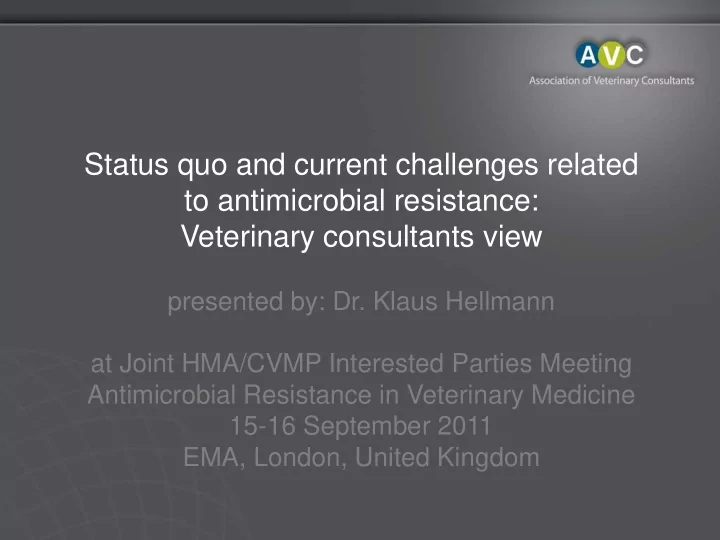

Status quo and current challenges related to antimicrobial resistance: Veterinary consultants view presented by: Dr. Klaus Hellmann at Joint HMA/CVMP Interested Parties Meeting Antimicrobial Resistance in Veterinary Medicine 15-16 September 2011 EMA, London, United Kingdom
Items What has been achieved in the last 18 months What are the plans for the next 18 months, highlighting the priority areas Suggested areas of greater collaboration
Achievement of last 18 months
Achievement of last 18 months
Achievement of last 18 months Measures targeted at MAH: • SPCs of FQ and Ceph harmonised by research based companies, but constant lack of implementation in member states based on lack of empowerment • SPC guideline for 3rd/4th generation Ceph • Concept paper for macrolides • Concept paper on guidance on the efficacy testing of antimicrobials in the target species ( EMA/CVMP/EMA/760764/2010 ), see AVC comments
Achievement of last 18 months Others: • Retailers selling products claiming „not treated with antimicrobials “, „FQ free raised “, „ no antimicrobials in the feed during raising “, but limited to small market of consumers • 90 % of consumer care about price only • Animal Welfare initiatives taken • Integrated Approach in The Netherlands involving: producers, suppliers (vets), retailers, consumers; driven by politicians and press
Results from Measures Awareness has grown Resistance rates stable, in case of actions going down in controlled markets (NL, DK, GER) Patience of non-scientific parties involved gone down albeight all actions taken In the NL: slight reduction (10 % reported by Dr. T. Lam at ECBHM in Liège on 7SEP11) using an integrated approach driven by farmers, vets, consumers, state Even more unforeseeable future for pharmaceutical industry
What is the best to feed the world, to have good health, to have comfort?
Items What has been achieved in the last 18 months What are the plans for the next 18 months, highlighting the priority areas Suggested areas of greater collaboration
Plans for next 18 months Stay scientific, and pragmatic Wait for the evaluations of data collected Volume of AM use Resistance patterns in MS and EU Draw conclusions and initiate action based on scientific knowledge Invest further into understanding of development/ occurrence of AMR in individual active ingredients (shoot at mass use, not at minor use!) Progress on „responsible use“ activities
Plans for next 18 months Targeted at MAH and industry Encourage R&D for antimicrobial products for food producing animals and pets Encourage development of efficient diagnostic tools (speed and cost sensitive!) Assure availability of labs for rapid diagnosis Be aware of the unforeseen consequences Define „ go “ and „ no go “ for applicants
Plans for next 18 months Targeted at Prescriber/User Train/teach responsible use Before implementing ever stricter obligations to some parties, assure commitment of all in all MS Define criteria of use: animal and possibly disease specific incl. pharmacological principles Implement requirements Monitor/Control requirements
Items What has been achieved in the last 18 months What are the plans for the next 18 months, highlighting the priority areas Suggested areas of greater collaboration
Marienbad, CZ 20.05.2009 Suggested areas of greater collaboration Anything to achieve less bacterial disease, to support responsible use of Antimicrobials, but keeping the balance!
CORE is to WORK on FACTS • Science driven based on current data • Panic is not the correct adviser • Target first factors that are most obvious (e.g. use of Ceph in poultry) • Implement EU requirements on animal husbandry/welfare/hygiene: insist on this! • Implement incentives to reduce use of antimicrobials on farms (e.g. milk SCC, NL) • Support availability and use of vaccines • Support innovation for antimicrobial treatment
CORE is to WORK on FACTS Avoid: • that measures are implemented in panic without appropriate risk assessment • Whatever is implemented, it will have known and unexpected consequences • „After a plague is before the (next) plague“ (J. Hacker, president of Leopoldina) • „Bacteria will always have the last word“ (L. Pasteur) • Ban of Feed Additives: was it successful? Did we reach, what was foreseen/wished? • No drawing of un-justified conclusions (EFSA)
Question on ESBL EFSA states, that most eminent problem in poultry! In Poultry – No MA • In ovo use? • Misuse? Implement appropriate controls!
Set Incentives right considering consequences Incentives for improvement of husbandry • Political and financial support Incentives for better health (retailers/consumers) • Incentives for better health (possible measured as reduced consumption of AM) Incentives for innovation of VMP replacing AM: • For products avoiding/replacing AM use? • Accelerated/provisional marketing authorisation? • Define influence on risk assessment
Please keep in mind Any action must strive to balance, on the one hand, the need for the affordable availability/development of effective (new) products (including novel actives) to ensure the future health and welfare of animals (pets and food producing species), and the security of supply of human food derived from animals with, on the other hand, concerns regarding safety including antimicrobial resistance. It is imperative that the legal requirements do not raise the (data) requirements for the use/development of products to a point where availability/development of (new) products is no longer affordable (low RoI compared to risk) To do so would risk creating far greater concerns for both animal and human welfare through the lack of safe and effective antimicrobial products to treat ill animals.
Marienbad, CZ 20.05.2009 Thank you for the support of the working party on antimicrobial resistance of AVC Dr. Klaus Hellmann klaus.hellmann@klifovet.com www.avc.at
Recommend
More recommend